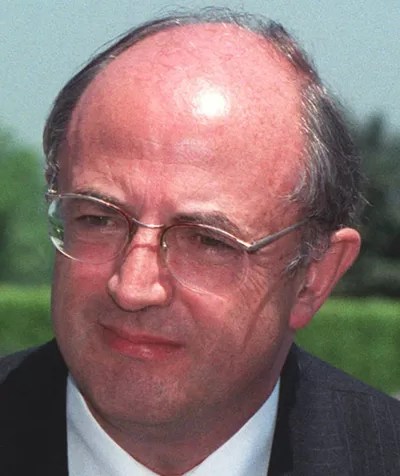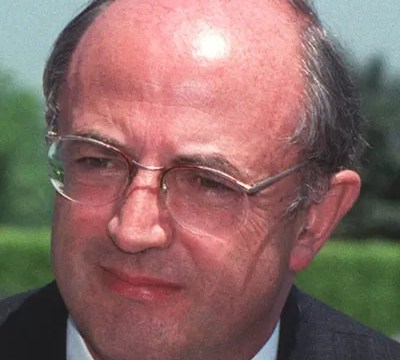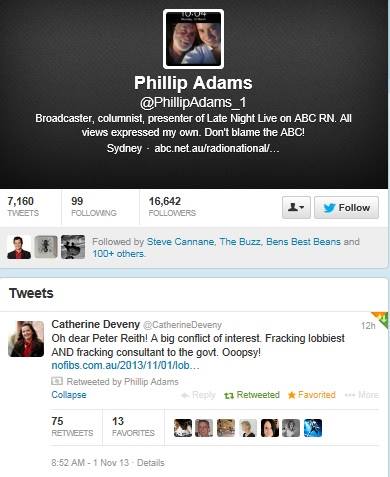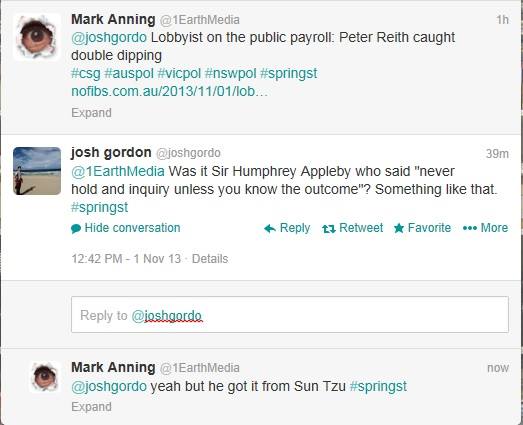During the campaign against Fracking in Australia, 1EarthMedia was on the lookout for the gas industry’s next moves as they expanded across the country. In late 2013, former Liberal Party politician Peter Reith appeared on the ABC’s The Drum spruiking the Victorian Government Gas Taskforce’s report recommending that fracking commence immediately across Victoria.
Even before Reith’s TV segment had finished, 1EarthMedia had typed three words into google: “Peter Reith lobbyist”. Nailed it – Peter Reith as Chairman of Victoria’s Gas Taskforce was also a paid lobbyist for a gas industry contractor (Thiess) and a gas exploration license holder (NSW Aboriginal Land Council).
1EarthMedia started typing up the first story, reprinted below and contacted NoFibs editors Margo Kingston and Stephanie Dale to alert them the story was coming. Reith was obviously going to be hitting the media circuit hard for the next few days so there was no time to waste – it was even possible that a government decision might be imminent.
The next morning, 1EarthMedia and Dale were negotiating, editing and publishing the first story while Peter Reith was on talkback radio and breakfast TV talking up the gas industry. By 10am the story was published on NoFibs, and by 10:15am it was all over Twitter and other social media.
Vested Interest: P.Reith on payroll of Coal Seam Gas coys #csg #vicpol #auspol #nswpol #Fainehttp://t.co/nx1JoAQjq0 pic.twitter.com/zXp5UxsKCn
— Mark Anning (@1EarthMedia) October 31, 2013
By 11am 1EarthMedia had spoken with the ABC’s Melbourne bureau chief and the Australian Financial Review & The Age state political editor to discuss the breaking and developing story.
The key question to ask: Was there any consultation with farmers by the Gas Taskforce? The gas industry were expecting to have access to farmer’s properties and place their gas wells, often drilling down into the water table and aquifers. The vast majority of farmers may own the title over their land but they don’t hold the exploration licenses over the property.
By the end of the week, the FOI response came back and the ABC and Fairfax newspapers were publishing balanced stories. The FOI revealed there was only one telephone call to the Farmer’s Federation who claimed they could get the farmers to support the gas industry. In other words, activist parlance, the gas industry did not have a social license.
Two days after first story being published, 1EarthMedia was writing a follow up story for NoFibs, and was able to include Peter Reith’s response when he came onto Twitter and found a lot of angry people. Twitter in 2013 was restricted to 120 characters.

Peter Reith reply on Twitter: @1EarthMedia you have your facts wrong. Best not to follow people who enjoy conspiracy theories.
Within a few weeks after considerable debate in the parliament and in both social & traditional media, Victoria decided not to lift their moratorium on fracking and onshore gas production which had been imposed a year earlier.
At the conclusion of the No Fibs CSG citizen journalism project, Stephanie Dale wrote: “We’ve claimed news space in a highly competitive field, sparking the attention of mainstream news media with CJ Mark Anning‘s piece exposing former Workplace Relations Minister and ABC commentator Peter Reith’s conflicts of interest in the CSG debate.”
For years afterwards, the NoFibs story was third on the google results for the search term “Peter Reith” -even ahead of traditional media conglomerates and including the stories from Reith’s controversial career as a Liberal Party government Industrial Relations and Defence Minister: his “children overboard” lie during the 2001 Australian federal election campaign; his failed attempt to use Australian Armed forces personnel as waterfront workers and the use of balaclava clad hired security guards with dogs, to remove working waterside workers from their work site during the 1998 waterfront dispute; and the $50,000 bill to taxpayers after Reith gave his government phone “tele-card” to his son.
1EarthMedia’s timely published stories and use of social media was able to set the agenda for the political debate on the gas industry expansion into Victoria. We acknowledge that debate would have happened regardless with probably the same outcome but 1EarthMedia was able to set the debate on the right course from the outset.
1EarthMedia’s strategy was to write the broad outline of the debate and then use Twitter to attract the attention of traditional media, in much the same way as an ‘old school’ press release.
The moratorium on onshore gas exploration was in place until 2020 when, during the chaos of the Covid-19 pandemic, the state ALP government lifted the ban on conventional gas but permanently banned fracking.

Google ranked the story on Peter Reith higher than traditional media
__________________________
Peter Reith On The Payroll – Chairman of Victoria’s Gas Taskforce while also paid lobbyist for gas industry.
By Mark Anning.

It was interesting to see the opinion piece written by Peter Reith for The Drum – Fracking scare campaigns threaten our prosperity – especially considering Reith is a paid political lobbyist and chairman of the Victorian Government’s task force on the eastern gas market.
“The public debate is soon mired in myriad false claims, partly because government has not ensured the public is fairly informed and because some activists have other political agendas,” writes Reith.
To ensure that the public is fairly informed, and agendas and vested interests are properly tabled, it should be noted that Peter Reith is a lobbyist for First State Advisors and Consultants Pty Ltd.
Who does First State Advisers lobby for?
A full list of Reith’s clients is published on the government website.
Two major players in the coal seam gas industry are Reith’s clients: Thiess and the NSW Aboriginal Land Council.
Thiess has won a $1.8 billion contract from CSG producer QGC for the construction of gas compression facilities in Queensland’s Surat Basin.
Another of Reith’s lobbying clients, the NSW Aboriginal Land Council has applied to explore for coal seam gas beneath 40 per cent of the state, sparking outrage from indigenous and non-indigenous people alike.
There has been considerable debate on the exposure by ICAC this week of the alleged vested interests of Messrs. Mooney and Grayson in their manipulation of the Great Barrier Reef Marine Park Authority and their financial ties to the coal industry.
Peter Reith is paid to lobby government by a major fracking contractor and a major mining lease explorer. Reith is also paid by the Victorian Government to advise them on fracking. It would seem that potential conflicts of interest are not limited to the coal industry.
Reith goes on: “There is virtually no country in the world that bans fracking because there is no reason to do so.”
A global list of bans on fracking is updated here.
“The most immediate issue is that in the early years from 2014, the Queensland LNG export plants may not be able to acquire sufficient natural gas from their new gas fields and, in that case, they will source gas from sources otherwise slated for domestic use, thereby pushing up the price,” writes Reith.
However, Sydney Morning Herald economics editor Ross Gittins succinctly torpedoed Reith’s flawed logic, in his article published 9 October 2013, titled Industry’s coal seam gas campaign is a con.
Gittins writes: “The gas industry is working a scam on the people of NSW, in collusion with other business lobby groups and federal and state politicians. It’s trying to frighten us into agreeing to remove restrictions on the exploitation of coal seam gas deposits. Failing that, the various parties want to be able to lay the blame for an inevitable jump in the price of natural gas on the greenies and farmers.”
If anything, Reith’s argument demonstrates the very real need for Australia, and for each state, to develop a Gas Reservation Policy to ensure domestic supply.
Major gas users, such as the plastics, chemicals and steel industries have all called for a Gas Reservation Policy to keep prices stable and ensure supply.
Not surprisingly, the gas industry opposes such a policy because they want to control the market, set the price, decide who they sell to and, most importantly, set the quota for gas extraction.
Reith claims ‘fracking was invented in the late 1940s’.
This too is a con, as the statement is usually accompanied by the assertion that fracking has occurred for decades without incident.
The truth is that in 1997 the acknowledged ‘father of fracking’, George Mitchell, developed the hydraulic fracturing technique known as ‘slickwater fracturing’, which involves adding chemicals to water to increase fluid flow, thus making shale gas extraction economical. That is the fracking technique now used – it is only 15 years old and has not been tested on the scale currently being rolled out worldwide.
Even the Father of Fracking expressed major concerns about his process later in his life: “As a concerned businessman and philanthropist, I have come to understand that the natural gas industry can no longer simply focus on the benefits of shale gas while failing to address its challenges. We know that there are significant impacts on air quality, water consumption, water contamination, and local communities.”
Reith ends his opinion piece with this observation: “Queensland has worked through the same issues as Victoria and New South Wales. Rather than turning a blind eye to the possibilities of natural gas, the southern states would do well to learn from Queensland’s mistakes and look carefully at the success they are now enjoying.”
Farmers who allow coal seam gas onto their land are forced to sign a confidentiality clause forbidding them from speaking out against the horror stories in Queensland. It is unfortunate that government and the coal seam gas industry is turning a ‘blind eye’ to those people who are living with the problems caused by coal seam gas.
Considering that Peter Reith’s company, First State Advisors and Consultants Pty Ltd, benefits financially from major coal seam gas company Thiess and the CSG lease holder NSW Aboriginal Land Council, it is difficult to know when his professional lobbying ends and his public role begins.
#CSG: Conspiracies, mouthpieces and independence:
Mark Anning @1earthmedia reports

On 28 July 2013, the oil and gas industry peak body – Australian Petroleum Production and Exploration Association (APPEA) – issued a press release, stating: “The recent coal seam gas episode of ABC 2’s Shitsville Express was a pleasant surprise – a balanced piece of reporting on coal seam gas.”
Shitsville Express is hosted by Joe Hildebrand, who, according to his Daily Telegraph Google blurb, writes ‘opinion commentary’.

Is Joe Hildebrand an opinion commentator? A comedian? Is he a PR man?
Or is he a journalist – as described by his Daily Telegraph bio – bound by the MEAA journalists’ code of ethics?
The day after Shitsville Express screened, former Stop CSG Party Senate candidate Brian Monk reportedly wrote on Facebook: “At the time I felt he was a puppet, just the way he was trying to provoke us.”
On the ABC’s Facebook page, Mr Monk challenged Mr Hildebrand: “Joe, you jumped into the Condamine River above where the industry is operating – why didn’t you take the time to swim with the bubbling gas? Joe, give me a break, I told you to go to the Bubbling Condamine, you said you didn’t have time. I think this is one of the most important discussions in our country and you [told me that you] weren’t even coming out here at all because everyone was too tired. Then you changed your mind and turned up here without time to go see anything real.”
Mr Hildebrand’s comments on the ABC Facebook page, which were viewed by contributors as inflammatory and provocative, have since been deleted.
APPEA’s press release notes that Hildebrand interviewed a pro-CSG farmer, Tara Estate anti-CSG activists, Origin Energy Upstream regional manager Rob Hart and agricultural scientist Professor Stephen Raine, who also holds a government appointed position of Queensland Gasfield Commissioner.
APPEA’s chief operating officer Mr Rick Wilkinson is also a Queensland Gasfield Commissioner.
Shitsville interviewee Rob Hart’s company, Origin Energy, is the suspected source of the bubbling Condamine River. CSG expert Dr Gavin Mudd from Monash University told ABC News last year that it ‘beggars belief that there could be no contribution by industry’ to the mysterious bubbling in the Condamine. Dr Mudd said there was no evidence to support Origin’s claim that the source of the bubbles was ‘a natural phenomenon caused by a shallow coal seam’.
Lock The Gate Alliance president and Australian Environmentalist of the Year 2013, Drew Hutton drew attention to the issue in this video. Lock the Gate says in the video’s caption: “Methane bubbling through the Condamine River in Queensland is only a part of the problem caused by coal seam gas on the Western Darling Downs. CSG activities are also causing methane to come to the surface in old uncapped holes across the region, presenting a major health hazard.”
On 29 July, the day after APPEA’s praise for Hildebrand’s Shitsville Express, it was revealed that APPEA had launched a multimillion-dollar pro-gas advertising blitz.
“For too long, vocal minorities have dictated public policy – the tail has wagged the dog,” BG Australia chairman and Reserve Bank of Australia board member Catherine Tanna told The Australian Financial Review.
In October, 2013, APPEA released a newsletter stating that Victorian Deputy Premier Peter Ryan saw a ‘need for natural gas from coal seams in Victoria’.
“With gas availability on the East Coast projected to tighten next year, Victorian Deputy Premier Peter Ryan has acknowledged this could trigger significant increases in gas prices for Victorians,” APPEA said.
The Deputy Premier’s office responded: “A story which appeared in the APPEA newsletter on Thursday contained a blatant misrepresentation of Mr Ryan’s views on coal seam gas. This misrepresentation was unfortunate and unhelpful in public discussions on this issue. Victoria has vast reserves of offshore natural gas and will not be rushed on the issue of onshore coal seam gas.”
And APPEA responded: “The Deputy Premier’s Office raised concerns about the headline and first sentence. As a courtesy, we removed it from our website.” APPEA later issued a new version of the newsletter.
This is not the first advertising campaign in which APPEA have misquoted their sources, prompting an official rebuttal.
In 2012, the CSIRO issued a media release stating: “CSIRO rejects the claim made in a television commercial aired on Sunday 2 September that ‘CSIRO [and government studies] have shown that groundwater is safe with coal seam gas’. At no time has CSIRO made such a statement, and nor do the results of CSIRO research support such a statement. CSIRO has stated on the public record that coal seam gas extraction is likely to pose a ‘low risk’ to groundwater quality through contamination. CSIRO has also indicated that groundwater levels will fall as a consequence of coal seam gas extraction. In some places this could see aquifer levels subside by tens of metres for tens of years; in others it is likely to reduce aquifer levels by several metres for several hundred years.”
According to the statement, CSIRO became aware of the advertisement produced by APPEA via a scan of social media on Friday August 31 and requested the commercial not be aired. These requests were subsequently ignored, prompting CSIRO to defend its position on CSG extraction.
In response to the mining ad blitz, Mr Hutton said: “The TV advertisements are based on a whole lot of misleading concepts such as: CSG has a minimal impact on farm land, can be conducted harmoniously with agriculture and is a clean green energy source. This multi-million dollar advertising campaign is a slap in the face to rural communities who are living in fear of the impacts on their farms, their health and their water resources … we are not prepared to tolerate it.”
Landholder group, the Basin Sustainability Alliance (BSA) expressed concerns about ‘APPEA Chief Operating Officer Mr Rick Wilkinson’s ability to be impartial in his new role as a Queensland Gasfields Commissioner when he is authorising industry advertising like this’.
BSA chair David Hamilton said: “These sorts of tactics do little to build landholder and community trust in both the industry and newly formed Gasfields Commission. There needs to be a truthful and transparent exchange of information, that is not clouded by public relations spin.”
The Queensland Government established the ‘independent statutory body’ GasFields Commission ‘to give local communities a more direct say on the responsible development of the CSG-LNG industry’.
On 6 November 2013, APPEA’s chief operating officer Paul Fennelly called on the Victorian Government to end their ban on fracking immediately, saying it would be ‘economically negligent’ to delay responding to the report until after the 2014 election. Mr Fennelly said Queensland had successfully managed to balance the interests of farmers, gas companies and local communities, partly through the Gasfields Commission. He said the Greens were ‘trying to shut down the state’.
According to Rick Wilkinson’s LinkedIn page, he ‘heads APPEA’s policy development and advocacy for Queensland, NSW and Victoria’.

“The State Government should immediately ask Mr Wilkinson to stand down from the Gasfields Commission,” said Mr Hutton.
As revealed in the No Fibs article of 1 November, 2013, this is not the only instance of paid coal seam gas industry professionals moonlighting as ‘independent’ government advisers.
Peter Reith, chairman of the Victorian taskforce set up to advise government on their CSG policy, is also working as a lobbyist with First State Advisors for coal seam gas industry clients Thiess and the NSW Aboriginal Land Council.
When asked if he’d seen that No Fibs story, Peter Reith responded:
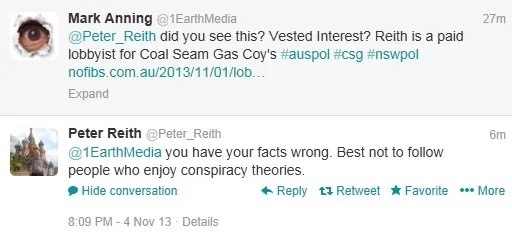
To quote Wikipedia: “A conspiracy theory is an explanatory proposition that accuses two or more people, a group, or an organization of having caused or covered up, through deliberate collusion, an event or phenomenon of great social, political, or economic impact. In recent decades the term has acquired a derogatory meaning, and a careful distinction must be made between the derisive use of the term and reference to actual, proven conspiracies.”

Peter Reith countered with an opinion piece in the ABC Fighting false claims in the gas debate
“The Weekly Times front page last week claimed that the still secret report left “Farmers Shafted”. The headline could not have been more misleading. The newspaper report was based on a freedom of information request (FOI) from the ALP and a comment from the Victorian Farmers Federation. The farmers complained that the Taskforce was too slow in seeking their views. In fact, after making numerous phone calls to the farmers for a meeting and getting no reply, we sent them an email and they decided it was not relevant to them.”
“This was not advised to the Taskforce and they only agreed to meet after we made a further request. Far from being “shafted” the report includes extensive recommendations for the coexistence of farmers and the gas industry, including a better financial deal for farmers and regional areas and important involvement by the agriculture sector in key issues such as independent management of water issues.” – Peter Reith
Editor’s note (November 18, 2013): The Drum has received a number of messages asserting that Peter Reith has an undeclared interest in the gas industry. Mr Reith is special counsel to First State, a government and corporate relations advisory firm. He informs the Drum that he is not an equity partner in the firm and that he has not done any government relations work for the gas industry. In both articles he has written for the Drum on this topic he has declared his chairmanship of the Victorian gas taskforce.
